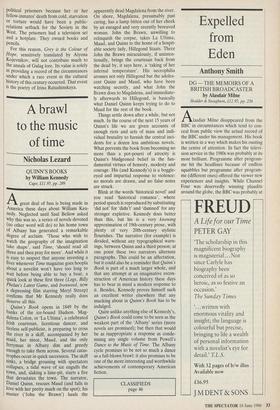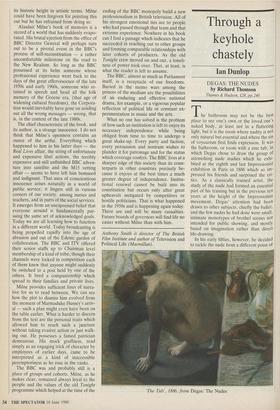Expelled from Eden
Anthony Smith
DG — THE MEMOIRS OF A BRITISH BROADCASTER by Alasdair Milne
Hodder & Stoughton, £12.95, pp. 236
Alasdair Milne disappeared from the BBC in circumstances which tend to con- ceal from public view the actual record of the BBC under his management. His book is written in a way which makes his ousting the centre of attention. In fact the televi- sion service in the 1980s was probably at its most brilliant. Programme after program- me hit the headlines because of endless squabbles but programme after program- me (different ones) offered the viewer new experiences and insights. While Channel Four was deservedly winning plaudits around the globe, the BBC was probably at
its historic height in artistic terms. Milne could have been forgiven for pointing this out but he has refrained from doing so.
Alasdair Milne's book of memoirs is a record of a world that has suddenly evapo- rated. His brutal ejection from the office of BBC Director General will perhaps turn out to be a pivotal event in the BBC's process of self-reconstitution — a rather uncomfortable milestone on the road to the New Realism. So long as the BBC possessed at its helm someone whose professional experience went back to the days of the great effervescence of the late 1950s and early 1960s, someone who re- tained in speech and head all the folk memory of the Greene era, (that age of widening cultural freedoms), the Corpora- tion would inevitably have gone on sending out all the wrong messages — wrong, that is, in the context of the late 1980s.
The chief characteristic of the book, and its author, is a strange innocence. I do not think that Milne's openness contains an ounce of the artful. Everything which happened to him in his latter days — the Real Lives affair, the string of unfortunate and expensive libel actions, the terribly expensive and still unfinished BBC adven- ture into satellite and the M15 vetting affair — seems to have left him bemused and indignant. That aura of conscientious innocence arises naturally in a world of public service; it lingers still in various corners of our society, among nurses and teachers, and in parts of the social services. It emerges from an unexpressed belief that everyone around is fundamentally pur- suing the same set of acknowledged goals. Today we are all learning how to function in a different world. Today broadcasting is being propelled rapidly into the age of abrasion and out of the Edenic garden of collaboration. The BBC and ITV offered their senior staffs up to Chairman level membership of a kind of tribe; though their channels were locked in competition each of them knew that anyone might suddenly be switched to a post held by one of the others. It bred a companionship which spread to their families and private lives.
Milne provides sufficient lines of narra- tive for us to read between. We can see how the plot to dismiss him evolved from the moment of Marmaduke Hussey's arriv- al — such a plan might even have been on the table earlier. What is harder to discern from the text are the personal traits which allowed him to reach such a juncture without taking evasive action or just walk- ing out. He possesses a famed patrician demeanour. His mock gruffness, read simply as an engaging trick of character by employees of earlier days, came to be interpreted as a kind of inaccessible peremptoriness as he rose in the ranks.
The BBC was and probably still is a place of groups and cohorts. Milne, as he makes clear, remained always loyal to the people and the values of the old Tonight programme which helped at the time of the ending of the BBC monopoly build a new professionalism in British television. All of his strongest emotional ties are to people who had passed through that team and that extreme experience. Nowhere in his book can I find a passage which indicates that he succeeded in reaching out to other groups and forming comparable relationships with later cohorts of producers. As the old Tonight crew moved on and out, a loneli- ness of power took over. That, at least, is what the reader is left to assume.
The BBC, almost as much as Parliament itself, is a receptacle of our freedoms. Buried in the memo wars among the princes of the medium are the possibilities of an enduring and effective national drama, for example, or a vigorous popular reflection of political life or constant ex- perimentation in music and the arts.
What no one has solved is the problem of how such an institution is left to enjoy its necessary independence while being obliged from time to time to undergo a great shake-up. Every party and faction, every persuasion and nostrum wishes to plunder it for patronage and for the status which coverage confers. The BBC lives at a sharper edge of this society than its coun- terparts in other countries precisely be- cause it enjoys at the best times a much greater degree of independence. Institu- tional renewal cannot be built into its constitution but occurs only after great upheavals instigated by competitors or hostile politicians. That is what happened in the 1950s and is happening again today. There are and will be many casualties. Future boards of governors will find life no easier without Milne than with him.
Anthony Smith is director of The British Film Institute and author of Television and Political Life (Macmillan).



















































 Previous page
Previous page